Bhagavad-gita as the LED light for our life – On the occasion of Gita Jayanti, let us consider the life-affirming and enriching message of the Bhagavad Gita by contemplating three of its core teachings and how they bring a positive vision to our life and our understanding of divinity. These three teachings can be represented by the acronym LED. Just as LED light can illuminate an area, the teachings of the Gita can illuminate our heart and life when we understand its vision for Life, Endeavor, and Divinity.

Life:
The Bhagavad Gita explains that life is inherently sacred. The value of our life does not come from how much the world values it. Often, when someone is not very famous, successful, or popular, they may start thinking, “What is the use of my life?” Such thoughts can lead to depression, inferiority complexes, or even suicidal tendencies.
However, the Gita teaches us that the value of our life comes not from external validation by others or even by ourselves. Our life’s value comes from our intrinsic spiritual identity—who we are at our core. We are spiritual beings, and therefore, our life has inherent dignity. This is the first teaching of the Gita, as seen in 2.7, which declares that while everything about us can be destroyed by the world, the core of who we are—the soul—can never be destroyed.
We often value life based on the gifts we have: health, wealth, fame, or education. However, the Gita inspires us to focus not on the gifts in life but on the gift of life itself.
Endeavor:
After understanding the sacredness of life, the Gita emphasizes the value of our endeavor. It offers us a positive vision: our efforts matter, even when they don’t seem to. This is evident in the well-known verse 2.47, which tells us that our focus should not be on the results of our actions but on the efforts we put in.
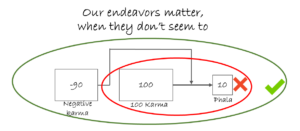
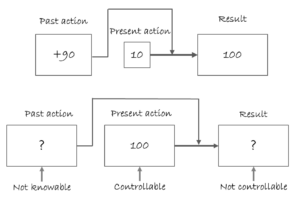
While this may seem counterintuitive—why should we not think about results?—the Gita explains that results are determined by a combination of factors: our present actions and our past karmic influences. For instance, we may act politely to ward someone today, but if they respond rudely, it may be because of how we treated them in the past, even if we don’t remember.
From this perspective, the law of karma is less about judgment and more about encouragement. It assures us that even when our efforts seem futile, they are never wasted. For example, we might put in an effort of 100 but receive a result of only 10 due to a negative karmic balance of -90. Conversely, there are times when we put in an effort of 10 and receive a result of 100 because of a positive karmic surplus.
Life may sometimes seem unfair, but the Gita assures us that it is “fairly unfair.” We can be fair to ourselves by valuing our efforts and continuing to endeavor wholeheartedly, no matter how the external results appear.
Divinity:
The Gita offers a transformative vision of divinity: God is not a distant figure demanding obedience or punishing disobedience. Instead, he is present within us, strengthening us to face life’s challenges. He is not subjecting us to life’s troubles but empowering us to grow through them.

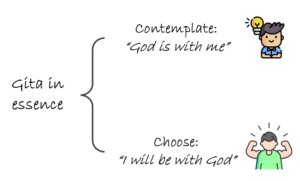
When we become conscious of God, he helps us by his grace to cross over all obstacles in life. Becoming conscious of God doesn’t mean turning away from the world or spending life in passive prayer. Instead, it means recognizing that God has a plan for this world and that each of us has a unique and valuable role in his plan.
Each of us is an eternal and precious part of God, and we can cultivate a service attitude by asking, “Oh Lord, how can I serve you in this situation?” Practically, this translates to asking, “How can I act to improve this situation?”
Because God is our greatest well-wisher and desires the best for us, he will guide us to move ahead even in the darkest situations. In time, we will realize how life’s challenges have brought us to a better place externally and shaped us into better people internally.
By understanding this positive vision of life, endeavor, and divinity, Arjuna, who was dejected at the start of the Gita, became enlivened. Similarly, we too can raise our metaphorical bow, face life’s challenges with confidence, and declare, as Arjuna did at the end of the Gita, “Karishye vachanam tava” (I will do your will).
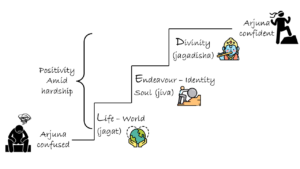
To summarize:
The Bhagavad Gita tells us that God is with us. Let us choose to be with God.
Thank you.
***
18.73 Arjuna said: My dear Kṛṣṇa, O infallible one, my illusion is now gone. I have regained my memory by Your mercy. I am now firm and free from doubt and am prepared to act according to Your instructions.

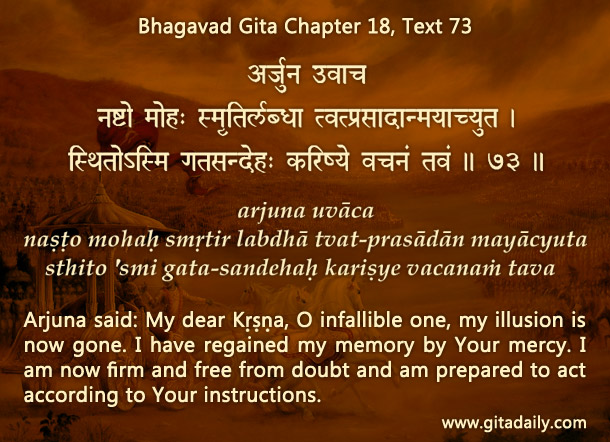

Leave A Comment